|
Oscar Wilde
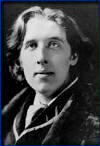 October
16, 1854, is the birthday of Irish writer Oscar Wilde. Born Oscar Fingal
O'Flahertie Wills Wilde in Dublin, he's responsible for penning the plays,
Lady Windermere's Fan (1893), A Woman of No Importance (1893),
and The Importance of Being Earnest (1895), as well as his only
novel, The Picture of Dorian Gray. One of the most popular--and
flamboyant--writers of his time, he remains one of the most quotable authors
in the English language today. October
16, 1854, is the birthday of Irish writer Oscar Wilde. Born Oscar Fingal
O'Flahertie Wills Wilde in Dublin, he's responsible for penning the plays,
Lady Windermere's Fan (1893), A Woman of No Importance (1893),
and The Importance of Being Earnest (1895), as well as his only
novel, The Picture of Dorian Gray. One of the most popular--and
flamboyant--writers of his time, he remains one of the most quotable authors
in the English language today.
Oscar Wilde was born in Dublin to unconventional parents. His mother,
Lady Jane Francesca Wilde (1820-96), was a liberal who wrote poetry and
worked as a journalist. Her
pen name was Sperenza. According to one story, she warded off creditors by
reciting Aeschylus. Wilde's father was Sir William Wilde, an Irish
antiquarian, gifted writer, and specialist in diseases of the eye and ear
who founded a hospital in Dublin a year before his son was born. His
work gained for him the honorary appointment of Surgeon Oculist to the Queen.
When Lady Wilde, who was active in the women's rights
movement of the day, learned of her husband's numerous romantic
escapades, she dealt with them by turning her head. She had other
business to care for.
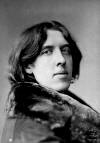 Wilde went to college at Oxford, where he
first learned to affect an aristocratic
English accent and dress in eccentric suits and velvet knee breeches.
He stayed in England after college, making a name for himself as a brilliant
conversationalist in the high society of London. A leading spokesman
for Aestheticism in the arts, Wilde
was outspoken and brash. The art movement's motto was
"Art for art's sake," and Wilde began lecturing on the importance of art
and beauty in people's lives. He said, "We spend our days
looking for the secret of life. Well, the secret of life is art."
And he said, "Even a colour-sense is more important, in the development of
the individual, than a sense of right and wrong." Wilde went to college at Oxford, where he
first learned to affect an aristocratic
English accent and dress in eccentric suits and velvet knee breeches.
He stayed in England after college, making a name for himself as a brilliant
conversationalist in the high society of London. A leading spokesman
for Aestheticism in the arts, Wilde
was outspoken and brash. The art movement's motto was
"Art for art's sake," and Wilde began lecturing on the importance of art
and beauty in people's lives. He said, "We spend our days
looking for the secret of life. Well, the secret of life is art."
And he said, "Even a colour-sense is more important, in the development of
the individual, than a sense of right and wrong."
 Wilde
worked for a women's magazine, writing essays, stories, and plays.
He was an art reviewer (1881) and a lecturer (1882). He lived in Paris
in 1883 and went on a lecture tour throughout Great Britain through 1884. From the mid-1880s, he was a regular
contributor to Pall Mall Gazette and Dramatic View. But
he wasn't respected as a serious writer until he came out with his
first and only novel, The Picture of Dorian Gray (1891). It's
the story of a
handsome young man who remains young while a portrait of him grows old.
After that literary success, Wilde burst upon the British theatrical scene with four
consecutive comedic hits: Lady Windermere's Fan (1893), A Woman of No Importance
(1893), An Ideal Husband (1895), and The Importance of Being
Earnest (1895), one of the wittiest plays in the history of modern
theater. Wilde
worked for a women's magazine, writing essays, stories, and plays.
He was an art reviewer (1881) and a lecturer (1882). He lived in Paris
in 1883 and went on a lecture tour throughout Great Britain through 1884. From the mid-1880s, he was a regular
contributor to Pall Mall Gazette and Dramatic View. But
he wasn't respected as a serious writer until he came out with his
first and only novel, The Picture of Dorian Gray (1891). It's
the story of a
handsome young man who remains young while a portrait of him grows old.
After that literary success, Wilde burst upon the British theatrical scene with four
consecutive comedic hits: Lady Windermere's Fan (1893), A Woman of No Importance
(1893), An Ideal Husband (1895), and The Importance of Being
Earnest (1895), one of the wittiest plays in the history of modern
theater.
Algernon: Did you hear what I was playing, Lane?
Lane: I didn't think it polite to listen, sir.
Algernon: I'm sorry for that, for your sake. I don't play
accurately--anyone can play accurately--but I play with wonderful
expression. As far as the piano is concerned, sentiment is my forte.
I keep science for life.
Lane: Yes, sir.
Algernon: And, speaking of the science of life, have you got the
cucumber sandwiches cut for Lady Bracknell?
Lane: Yes, sir.
Algernon: Oh! . . . by the way, Lane, I see from your book that on
Thursday night, when Lord Shoreman and Mr. Worthing were dining with me,
eight bottles of champagne are entered as having been consumed.
Lane: Yes, sir; eight bottles and a pint.
Algernon: Why is it that at a bachelor's establishment the servants
invariably drink the champagne? I ask merely for information.
Lane: I attribute it to the superior quality of the wine, sir.
I have often observed that in married households the champagne is rarely of
a first-rate brand.
Algernon: Good Heavens! Is marriage so demoralizing as that?
Lane: I believe it is a very pleasant state, sir. I have had
very little experience of it myself up to the present. I have only
been married once. That was in consequence of a misunderstanding between
myself and a young person.
Algernon: I don't know that I am much interested in your family life,
Lane.
Lane: No, sir; it is not very interesting subject. I never
think of it myself. - from The Importance of Being Earnest
At the opening of Lady Windermere's Fan, Wilde showed up wearing a green
carnation in his suit. After the final curtain went down and the crowd
erupted in applause, Wilde came out on stage and said: "Ladies and
gentlemen: I have enjoyed this evening immensely. The actors have
given us a charming rendering of a delightful play, and your appreciation
has been most intelligent. I congratulate you on a great success of
your performance, which persuades me that you think almost as highly of the
play as I do myself."
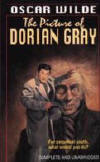 Although
flamboyantly gay and proud of it, Wilde
married Constance Lloyd in 1884 and, to support his family, edited Woman's
World magazine from 1887 - 1889. In 1888, he published The Happy
Prince and Other Tales, fairytales written for his two sons. It was first published
in serial form by Lippincott's
Magazine in 1890 and expanded to book form in 1891, with six added
chapters. The book contains several parallels with the author's own life. Although
flamboyantly gay and proud of it, Wilde
married Constance Lloyd in 1884 and, to support his family, edited Woman's
World magazine from 1887 - 1889. In 1888, he published The Happy
Prince and Other Tales, fairytales written for his two sons. It was first published
in serial form by Lippincott's
Magazine in 1890 and expanded to book form in 1891, with six added
chapters. The book contains several parallels with the author's own life.
At
Oxford, Wilde became a close friend of Frank Miles, a painter, and the
homosexual aesthete Lord Ronald Gower, both of whom Wilde represented in
Dorian Gray. In the story, Dorian, a Victorian gentleman, sells his
soul to keep his youth and beauty. His tempter is Lord Henry Wotton,
who lives selfishly for amoral pleasure. "If only the picture could
change and I could be always what I am now. For that, I would give
anything. Yes, there's nothing in the whole world I wouldn't give.
I'd give my soul for that."
Dorian sets out on a life of wicked acts, ruining the lives
of others,
causing a young woman's suicide, and murdering his own portrait painter,
Basil Hallward. Throughout all, he retains his physical youth, although his
portrait ages with every evil act, displaying Gray's monstrous image, a
sure sign of his moral leprosy. The book draws attention to the
difference between
the polished surface of society and a life of subhuman vice. In the
end, sin does not go unpunished. When Gray can no longer bear to look at the
painting, he destroys it. His own face turns into
a human replica of the portrait, and he dies. "Ugliness is the only
reality,'" Wilde summarizes.
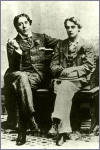 The
year following the publication of Dorian Gray saw more of Wilde's fairytales. But
his life
was far from innocent child's play. Wilde, who was never comfortable
with married life, had met Lord Alfred Douglas ("Bosie"),
an athlete and a poet, who became both the love of the author's life and his
downfall. "The only way to get rid of a temptation is to yield to it,"
Wilde once said. Bosie's uncle, Lord Jim, caused a scandal when he
filled in the 1891 census describing his wife as a "lunatic" and his stepson
as a "shoeblack born in darkest Africa." The
year following the publication of Dorian Gray saw more of Wilde's fairytales. But
his life
was far from innocent child's play. Wilde, who was never comfortable
with married life, had met Lord Alfred Douglas ("Bosie"),
an athlete and a poet, who became both the love of the author's life and his
downfall. "The only way to get rid of a temptation is to yield to it,"
Wilde once said. Bosie's uncle, Lord Jim, caused a scandal when he
filled in the 1891 census describing his wife as a "lunatic" and his stepson
as a "shoeblack born in darkest Africa."
Eventually, Wilde was charged with sodomy and went to trial.
He was found guilty and sentenced to two years in prison. On the last day of
the trial, Wilde wrote to his paramour, Lord Douglas, "This is to assure you of my
immortal, my eternal love for you. Tomorrow all will be over. . . .
Your love has broad wings and is strong, your love comes to me through my
prison bars and comforts me, your love is the light of all my hours."
In prison in London, Wilde was finally allowed pen and paper after more
than 19 months without them. By then, he had taken opposing views on
the potential of humankind toward perfection. He
wrote De Profundis (1905), a dramatic monologue and autobiography,
which was addressed to Alfred Douglas. "Everything about my tragedy has been
hideous, mean, repellent, lacking in style. Our very dress makes us
grotesque. We are the zanies of sorrow. We are the clowns whose hearts are
broken."
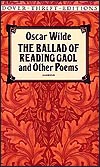 After
his release from prison in 1897, Wilde lived under the name, Sebastian Melmoth, in
Berneval near Dieppe, before finally moving to Paris. He wrote The Ballad
of Reading Gaol, revealing his concern for inhumane prison conditions.
On his death bed, he is rumored to have become a Roman Catholic. Oscar
Wilde
died of cerebral meningitis on November 30, 1900, penniless, in a cheap
Paris hotel, at the age of 46. After
his release from prison in 1897, Wilde lived under the name, Sebastian Melmoth, in
Berneval near Dieppe, before finally moving to Paris. He wrote The Ballad
of Reading Gaol, revealing his concern for inhumane prison conditions.
On his death bed, he is rumored to have become a Roman Catholic. Oscar
Wilde
died of cerebral meningitis on November 30, 1900, penniless, in a cheap
Paris hotel, at the age of 46.
"Do you want to know the great drama of my life," Wilde asked Andre Gide
before his death. "It's that I have put my genius into my life; all
I've put into my works is my talent."
Oscar Wilde wrote,
"It is only shallow people who do not judge by appearances" and
"It is absurd to divide people into good and bad. People are either
charming or tedious."

Discover Oscar Wilde
at Amazon.com
Indulge
Yourself - Check Out Today's Best-Selling
Fiction -
Nonfiction -
DVDs |






 After
his release from prison in 1897, Wilde lived under the name, Sebastian Melmoth, in
Berneval near Dieppe, before finally moving to Paris. He wrote The Ballad
of Reading Gaol, revealing his concern for inhumane prison conditions.
On his death bed, he is rumored to have become a Roman Catholic. Oscar
Wilde
died of cerebral meningitis on November 30, 1900, penniless, in a cheap
Paris hotel, at the age of 46.
After
his release from prison in 1897, Wilde lived under the name, Sebastian Melmoth, in
Berneval near Dieppe, before finally moving to Paris. He wrote The Ballad
of Reading Gaol, revealing his concern for inhumane prison conditions.
On his death bed, he is rumored to have become a Roman Catholic. Oscar
Wilde
died of cerebral meningitis on November 30, 1900, penniless, in a cheap
Paris hotel, at the age of 46. 
